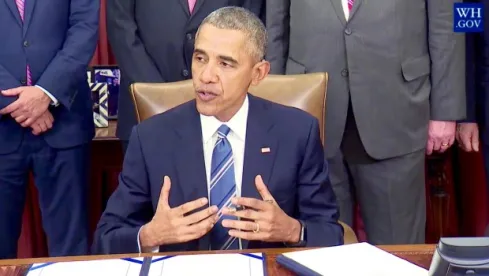On May 11, 2016, President Obama signed the Defend Trade Secrets Act of 2016 ("DTSA") into law. The President’s action follows the April 27, 410-2, vote by the U.S. House of Representatives in favor of this long-proposed legislation that federalizes trade secrets law. The U.S. Senate passed the legislation, 87-0, in March. For the first time, the DTSA allows companies to file civil lawsuits for trade secrets theft under the federal Economic Espionage Act ("EEA"). Until now, the EEA provided only for criminal cases lodged by prosecutors; private civil cases had to be filed under state law. The law takes effect immediately and applies to any misappropriation of trade secrets that occurs on or after enactment.
Unlike patents, copyrights and trademarks, trade secrets had been exclusively handled at the state level. While 48 of 50 states had adopted the Uniform Trade Secrets Act ("UTSA"), and all 50 states provide trade secret protections, there are state-to-state differences in the text and the application of the law. The primary goal of the DTSA is to further harmonize the law through a single federal statute, allowing for the development of more predictable, nationwide
case law.
Access to Federal Courts, Cause of Action and Remedies
The DTSA provides a federal, civil cause of action for misappropriation of a trade secret "if the trade secret is related to a product or service used in, or intended for use in, interstate or foreign commerce." The definition of "trade secret" is very similar to the definition under the UTSA, as is the definition of "misappropriation" (acquisition by "improper means"). "Improper means" expressly does not include reverse engineering, independent derivation or "any other lawful means of acquisition".
In addition to seizure (discussed below), the remedies include injunctive relief, damages, and under certain circumstances, the imposition of royalties, award of exemplary (double) damages, and/or attorney’s fees.
The law does not preempt state law regarding trade secret protection and does not impact non-compete law. A strategic decision must be made concerning whether to seek relief in state or federal court. Importantly, diversity of citizenship is no longer necessary to litigate trade secrets cases in federal court, where supplemental federal jurisdiction can now be exercised over related state law claims, such as breach of a non-compete agreement, unfair trade practice and breach of fiduciary duty. The anticipation is that many of these cases will now move from the state courts into the federal courts.
Unique Seizure Provision
The DTSA contains a unique seizure provision that allows plaintiffs to ask courts to order law enforcement officials to seize any property "necessary to prevent the propagation or dissemination of the trade secret" without a hearing or answer from the accused party. The criteria for issuing a seizure order are tightly circumscribed and any seizure order must provide for "the narrowest seizure of property necessary" and the seizure order must "direct that the seizure be conducted in a manner that minimizes any interruption of business operations" of third parties, and in the case of the person accused of the misappropriation, the seizure must be carried out in a manner that minimizes the interruption of "legitimate" business operations. A hearing must take place within seven days of the seizure by the law enforcement officer. Neither the applicant nor the person against whom the order is issued will have access to the seized property until the parties have an opportunity to be heard by the court. The applicant must provide security adequate for the payment of damages if a seizure is later found to be wrongful.
Seizures are likely to occur only in the most extraordinary of circumstances.
Protection of Trade Secret Information
The statute provides a procedure for filing trade secret submissions to the court under seal to keep the information confidential.
Injunction Against Working for a Competitor
In the absence of an enforceable non-compete agreement, the Court may still enjoin a defendant from working for a competitor, under specific limited circumstances. This is an important aspect of the law, which modifies the controversial "inevitable disclosure" doctrine developed in the state courts over the last twenty years but rejected outright or severely restrained by most courts in recent years.
Under the DTSA, if a company seeks an injunction limiting a former employee’s employment with a competitor, the company must demonstrate more than disclosure of a trade secret to the new employer is "inevitable" merely because: 1) the former employee had access to the trade secret; and 2) he would naturally disclose it to his new employer to gain a competitive advantage. The DTSA requires a showing that a disclosure is actually "threatened". One knowledgeable commentator has stated that the evidence must demonstrate that the former employee and/or his new employer "can’t be trusted" to honor the integrity of the company’s trade secrets. This showing might be made through evidence that the former employee downloaded confidential information before leaving the company.
The language of the statute is a bit arcane, stating that an injunction may be issued to prevent an actual or threatened misappropriation, provided that the order does not "prevent a person from entering into an employment relationship, and that conditions placed on such employment shall be based on evidence of threatened misappropriation and not merely on the information the person knows." It remains to be seen whether courts interpret this provision to permit an injunction against employment with a competitor if the evidence demonstrates that such an order is the only way to prevent the "threatened" or actual disclosure. It also remains to be seen what "conditions" courts may place on that employment, if permitted.
Whistleblower Immunity/Need to Modify Policies to Provide Notice of Immunity
The DTSA provides a safe harbor to individuals who turn trade secrets over to the government to investigate potentially illegal activity. The DTSA also requires employers to notify workers in any contract that is related to trade secrets or confidential information of their rights to turn over the confidential information to the government if illegal conduct is suspected.
This means that either in confidentiality agreements or in a handbook or policy that addresses confidentiality, there must now be a statement that employees cannot be held criminally or civilly liable for disclosure of a trade secret made in confidence to a government official or to an attorney for the sole purpose of reporting or investigating a suspected legal violation. If the notice is not provided, the remedies of exemplary damages and attorneys’ fees will not be available.
Report on Theft of Trade Secrets Abroad/Extra-Territorial Reach?
The Act requires the Attorney General to file a detailed report to the Judiciary Committees of the House and Senate within one year of enactment, and biannually thereafter, on the scope and breadth of the theft of trade secrets of United States companies occurring outside of the United States.
It is unclear whether the DTSA permits a U.S.-based company to bring an action in federal court against a foreign entity that allegedly stole trade secrets in a foreign country. At a minimum, Congress has established by this legislation a national policy against theft of trade secrets and has signaled its concern about theft by foreign entities. The statute suggests that further legislation may be necessary if U.S. companies continue to suffer loss of trade secrets by improper means employed by foreign companies or governments.
Take-Aways:
-
Modify existing policies and/or confidentiality agreements to provide the "notice of immunity".
-
In each new circumstance, carefully consider the best forum, state or federal court, in which to seek your remedies for misappropriation of trade secrets.




 />i
/>i


